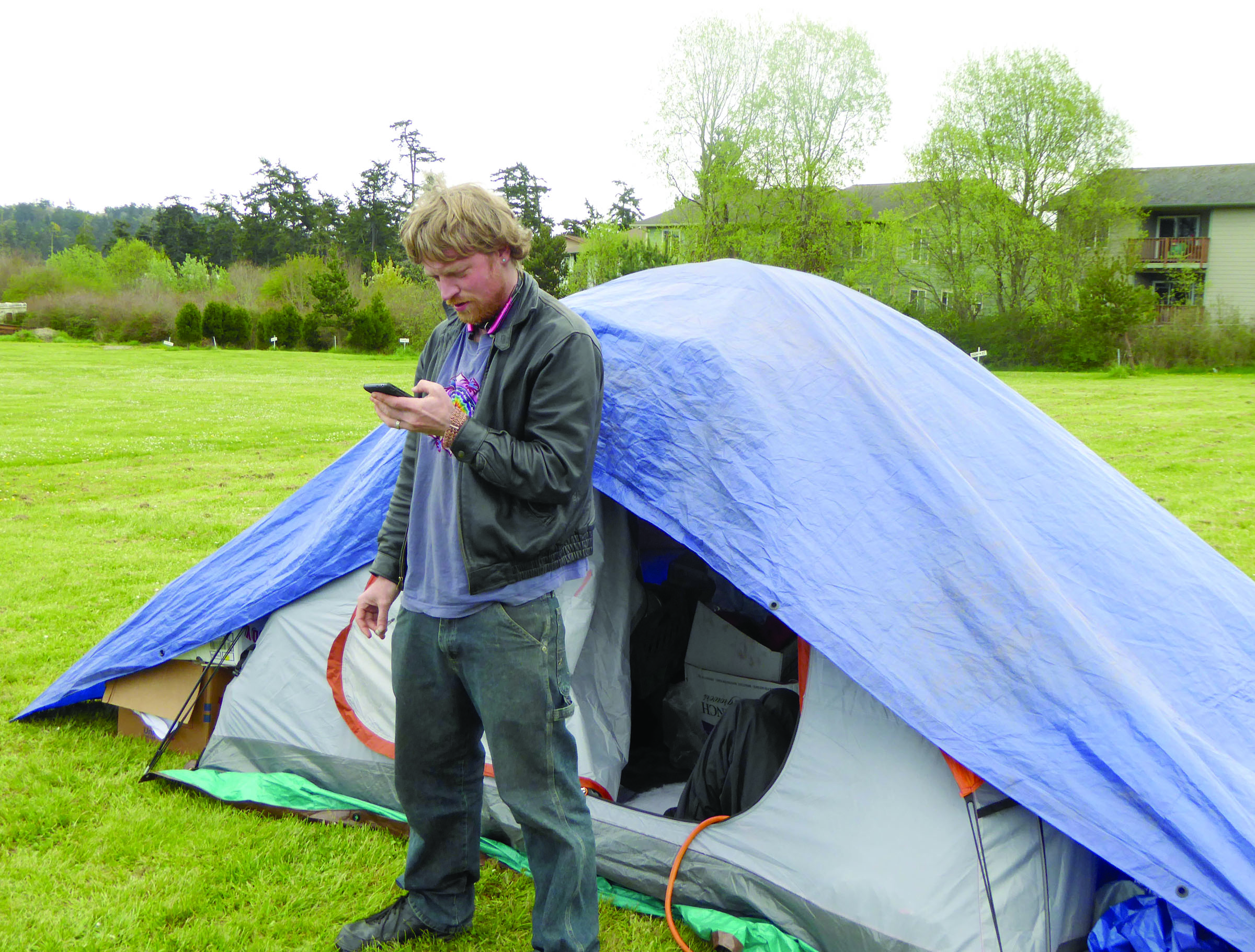PORT TOWNSEND — A small homeless encampment, a tent city of six campers, returned to the Jefferson County Fairgrounds on Saturday after spending nearly three weeks at Fort Worden State Park.
The campers will need to move again on April 20,
“It would be great if we could get a permanent spot,” said Levi Johnson, the group’s unofficial spokesman.
“We wouldn’t have to move around every 10 days,” he said. “We could set up and feel secure.”
The group formed after the closure of the Port Townsend Winter Shelter on March 13.
The group camped for 10 days at the fairgrounds, the maximum allowable campsite time, before moving to Fort Worden for 20 days, the maximum imposed by the state.
In both cases, campers unsuccessfully sought discount rates and an extension of the maximum stay.
“This is an interim action, something that will keep happening until we can find a permanent location for an emergency shelter,” Barbara Morey of Port Townsend told the Jefferson County commissioners on Monday.
Morey is the treasurer for an advocacy organization, the Affordable Housing Action Group, that has raised the money to fund the campers’ stays.
“You can’t imagine how difficult it can be to move every 10 days,” Morey said.
“If you are able to work, you need to take time off to move. It can be extremely destabilizing.”
Said Commissioner Phil Johnson: “I think Barbara vastly understated the problem.
“It can be extremely destabilizing to live in a tent.”
All three commissioners — Phil Johnson, Kathleen Kler and David Sullivan — expressed concern about the situation but initiated no action.
“They call it a tent city but there is no tent city defined by law or in an organized way that’s accountable,” Sullivan said after the meeting.
“We are looking to provide individual solutions for individual problems and there are systems in place for that.”
During the group’s first stint at the fairgrounds, manager Bill McIntire expressed reservations, citing previous problems with homeless campers.
He said there were no problems during the first stay.
McIntire said that at the end of 10 days, the group will be asked to leave again.
Levi Johnson said payment is being made for three days at a time, “so if we get kicked out we won’t lose as much money.”
During its first stay, the group was located in a tract at the edge of the field, an area that is now surrounded by tape and “keep out” signs.
Due to that closure, the group moved to the more expensive recreational vehicle slots which include electricity and water, although the water was not working, Levi Johnson said.
McIntire said he closed the campsites because of rain and that the ground was too wet to be a safe camping spot.
As for the water, he said it had been turned off for a repair and would be restored this week.
Only two of the original people are still among the campers.
The current group has three men and three women, including one child.
“If we didn’t have to move every 10 days . . .we would have an address, so we could get mail and get a job,” Levi Johnson said.
Living in a tent isn’t easy, said Fawn Arujo, who has a school-age child.
“I’m thankful that it’s here, but this is not where I want my child to go to school from,” she said.
One of the original members of the homeless group, John Prentice, found a job in Quilcene while another, DJ Larsen, has left town, Johnson said.
“DJ went to another place,” he said. “I think a lot of us will end up going to other cities where there are more opportunities.”
In the quest for a permanent location, Morey recommended Chimacum Park, making what she called a formal request to consider the park as a location and working to supply it with water, electricity and bathroom facilities.
In response, Kler said she had learned that a serious root rot condition of many of the park’s trees represented a safety hazard, that would need to be fixed before the park, which is currently closed, can be occupied.
Morey said the group has nearly exhausted its funds several times since its creation one month ago “but whenever the money is almost gone we get the money we need from donors.”
Those wishing to contribute items to the tent city can contact the Boiler Room, 360-379-8247.
Cash contributions can be taken to any branch of First Federal and deposited into an account in the name of “Port Townsend Tent City.”
________
Jefferson County Editor Charlie Bermant can be reached at 360-385-2335 or at charlie.bermant@peninsuladailynews.com.
